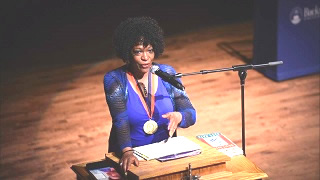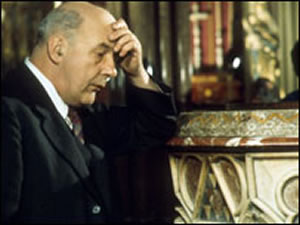De Duitse dichter en schrijver Johann Wolfgang von Goethe werd geboren op 28 augustus 1749 in Frankfurt am Main. Zie ook alle tags voor Johann Wolfgang von Goethe op dit blog.
Uit: Faust I
DER HERR:
Hast du mir weiter nichts zu sagen?
Kommst du nur immer anzuklagen?
Ist auf der Erde ewig dir nichts recht?
Mephistopheles:
Nein Herr! ich find es dort, wie immer, herzlich schlecht.
Die Menschen dauern mich in ihren Jammertagen,
Ich mag sogar die armen selbst nicht plagen.
DER HERR:
Kennst du den Faust?
MEPHISTOTELES:
Den Doktor?
DER HERR:
Meinen Knecht!
MEPHISTOTELES:
Fürwahr! er dient Euch auf besondre Weise.
Nicht irdisch ist des Toren Trank noch Speise.
Ihn treibt die Gärung in die Ferne,
Er ist sich seiner Tollheit halb bewußt;
Vom Himmel fordert er die schönsten Sterne
Und von der Erde jede höchste Lust,
Und alle Näh und alle Ferne
Befriedigt nicht die tiefbewegte Brust.
DER HERR:
Wenn er mir auch nur verworren dient,
So werd ich ihn bald in die Klarheit führen.
Weiß doch der Gärtner, wenn das Bäumchen grünt,
Das Blüt und Frucht die künft’gen Jahre zieren.
MEPHISTOTELES:
Was wettet Ihr? den sollt Ihr noch verlieren!
Wenn Ihr mir die Erlaubnis gebt,
Ihn meine Straße sacht zu führen.
DER HERR:
Solang er auf der Erde lebt,
So lange sei dir’s nicht verboten,
Es irrt der Mensch so lang er strebt.
MEPHISTOTELES:
Da dank ich Euch; denn mit den Toten
Hab ich mich niemals gern befangen.
Am meisten lieb ich mir die vollen, frischen Wangen.
Für einem Leichnam bin ich nicht zu Haus;
Mir geht es wie der Katze mit der Maus.
DER HERR:
Nun gut, es sei dir überlassen!
Zieh diesen Geist von seinem Urquell ab,
Und führ ihn, kannst du ihn erfassen,
Auf deinem Wege mit herab,
Und steh beschämt, wenn du bekennen mußt:
Ein guter Mensch, in seinem dunklen Drange,
Ist sich des rechten Weges wohl bewußt
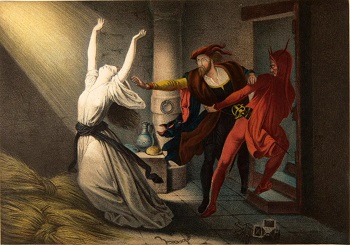
Johann Wolfgang von Goethe (28 augustus 1749 – 22 maart 1832)
Faust und Mephisto im Kerker door Joseph Fay, 1848
De Nederlandse schrijfster, dichter en beeldend kunstenaar Maria Barnas werd geboren in Hoorn op 28 augustus 1973. Zie ook alle tags voor Maria Barnas op dit blog.
Het regent op het Frederiksplein
Ze staat aan de rand van wat er staat
te gebeuren en omringende bomen verstarren
rechtop. Ze vouwt beloften aan anderen
op en spuugt twee woorden in het resolute
witte water. Een hond springt
over de rand als het begint
te regenen in de fontein.
Liefde had ermee te maken
maar het is alleen de taal die neigt.
En neigen blijft.
Fonteinen maken vergelijkbare gebaren
en de hond schudt zich nog uit zijn vacht
als dit zo door blijft gaan. Haar hand aarzelt
en waar haar woorden het water raken
beginnen twee honden te dagen.
Een zonder vacht de ander zonder hart.
Er staat een stad op
Vanaf de hoogste verdieping de stad in.
Beneden razen de straten van Buenos Aires.
De stad waar alles goed komt.
Ze nemen je mee in hoeken
van negentig graden. Maar het waait hier
schaduwen en het wentelt kiezelstenen
gebouwen. Er is er één
met een hart van geschaafde rode steen.
En om niet te zien hoe een hart zich uitstort
ga je naar beneden. Hou je schaduw bij je.
De rode zoom langs je hals mondt uit
in een rode rivier. Denk waterval.
Watervallen.
De klep van een piano slaat een huis stevig dicht.
Mept een gebouw tegen de muur.
In de lift struikel je over de drempel uit een zeker huis.
Een plafond van sterren stijgt.
Zo storten twintig verdiepingen. Languit.
Er staat een stad op.
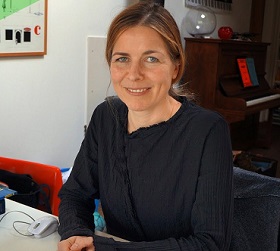
Maria Barnas (Hoorn, 28 augustus 1973)
De Nederlandse schrijver A. Moonen, (spreek uit: ‘a-punt-moonen’) werd geboren in Rotterdam op 28 augustus 1937. Zie ook alle tags voor A. Moonen op dit blog.
Uit: Eigen weg
“Voor verdere natuurbeschrijvingen sleept u maar enkele muffe streekromans onder uw keurige nest vandaan.
In de verdere loop der dag zal de serene stilte wel overstemd worden door bovenal een zwarte groeperingskliek met vetspekkig overzees oerwouddialect, vermoedelijk afkomstig uit Senegal en omstreken, een niet door mij thuis te brengen kreetlachtaaltje door voornamelijk manspersonen, soms begeleid via geboor en gehamer hunnerwege of andere buurtbevuilers, waar ik tijdens ‘genezingsproces’ de ganse zomer nogal nerveus – tegen overspanning aan – door raakte en slechts een ondernomen fietstocht bij schaars zonnig weertype afweer aan kon bewerkstelligen.
Ik fietste er een halfuurtje over om Kralingen te bereiken. Mij ontbloot te presenteren op toegestaan naaktrecreatiegedeelte der Kralingse plas begint zowaar een liefhebberij te worden. Rond een uur of halftwaalf op een eindelijk eens zonnige zondag bleek ’t nog vrij rustig, en waar ik mij bevond, zittend op een bankje met vóór mij een strook nat strandzand en in de verte enkele zeilscheepjes over wijdse plas varend, ontdaan mijner kleren, was ik de enige naturist. Mijn vreugdebron zwol geleidelijk aan tot volle stramme wasdom, bewoog brutaal van plezier met vurige, flinke kop. De stille omgeving leek speciaal voor mijn persoon ontworpen. Ge zou er zo een bordje eigen weg plaatsen. Soms werd de zon overwolkt. Bespiedde iemand mij links in het struikgewas? Teleurgesteld soms dat ik geen elfjarige ruige knaap betrof? Toch bleef ik niet langer dan een halfuur, kleedde mij weer aan en ondernam een fietstocht door het bos. Snoof de geur van lover en moeder aarde op.
Een week eerder had ik op het naaktgrasstrandje gelegen, bracht het zelfs zover dat een Marokkaan van middelbare leeftijd, zelf aangekleed zijnde, me nabijgekomen begon te aanschouwen. Net als bij mijn nog in z’n vaderland verblijvende vaste partner scheen m’n witte lichaam prikkelend op hem te werken, al waren er verderop tevens platte damesreten plus bungelende uiers te zien. Er volgde rap een afspraak ter samenvoeging in het bos. Hij popelde van ongeduld, leek me publiekelijk reeds te willen bespringen. Terwijl ik mij rustig begon aan te kleden, zag ik hem naast zijn fiets staan wachten op rijwielpad met achter hem zondaggangers over voetgangersgedeelte lopend, zich vergapend aan onverhoeds en door veler verrassing toegestane blootlijvigheid der geringe schaamtelozen in hun ogen waarschijnlijk. Een groepje jeugdige Marokkanen lachte mij samenzwerend toe; het afspraakje was hen op korte afstand van het nog overleggende duo niet ontgaan. Het tweetal zocht fietsend ’t bos af voor een geschikte plek. Fietsen tegen een boom.”
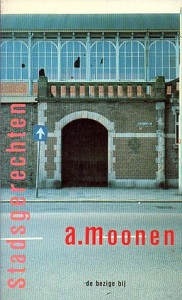
A. Moonen (28 augustus 1937 – 24 januari 2007)
Cover
De Nederlandse dichter, schrijver, letterkundige en literatuurcriticus Cornelis Jan (Cees) Kelk werd geboren in Amsterdam op 28 augustus 1901. Zie ook alle tags voor C. J. Kelk op dit blog.
Diana
In ’t najaar aangeland en zelf tot herfst geworden
vol spinnewebben, vocht en rottend loof,
ontwaar ‘k eerst nu de ondoorwaadbre kloof,
die mij gescheiden hield van Diana’s naakte horden.
De pijlen, die zij op zoo menig hert verschoten
snorden mijn levenlooze droom voorbij.
Hier kruipt een siepelend vocht door de vallei
en ginds aan d’overzij hoor ik ’t trappelen van de pooten.
Zij vluchten in het woud, maar worden toch gevangen
en vrouwen drukken ze aan haar boezems rijk.
Straks staan hun koppen op een disch te prijk,
waar zwoele monden hun de bouten prangen.
O zoo geschoten zijn, gejaagd en overwonnen,
o zoo te sterven aan het druppelende bloed,
maar toch ééns lust te zijn, verzadiging en gloed,
hoe snel ook al het vloeiende is geronnen!
Diana spant haar boog, haar benden volgen,
de herten tuimelen en het woud weerschalt!
Wanneer de nacht van blad en regen valt,
is reeds de buit gebraden en verzwolgen.
Die toch zijn hert geweest met trillende geweien
zonder ontkomen aan het mannelijke lot.
Getroff’nen van ’t godinnelijke schot
bleef niets hun over dan zich nedervlijen.
Nu zelf een herfst, in ’t najaar aangeland
vol spinnewebben, vocht en rottend loover,
doorschouw ik pas de onvervangbre toover
van ’t goddelijk jachtbedrijf aan de overkant.
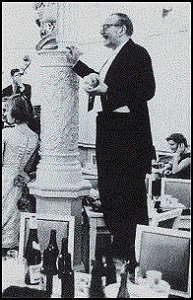
C. J. Kelk (28 augustus 1901 – 25 december 1981)
Hier op het boekenbal in 1964
De Australische dichter Frederick Kesner III werd geboren op 28 augustus 1967 in Manilla op de Filippijnen Zie ook alle tags voor Frederick Kesner op dit blog.
To Write
often it is the only
etched thing
between you and
improbability.
no stink kicked up,
no feigning love,
no affluence
can
hatch it.
One Child
Child of the outside
on the inside
one foot out
one foot in
never belonging
never apart
Child of the inside
on the outside
one foot in
one foot out
never apart
never belonging
Child of both sides
on neither side
both feet out
both feet in
never apart
never a part
Heart & soul divided
Mind & hands confused
Ears & nose demanding
Eyes & tongue confiding
Child of both
Child of none
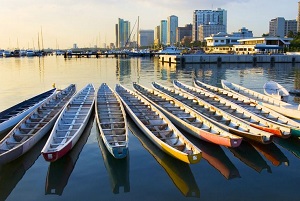
Frederick Kesner (Manilla, 28 augustus 1967)
Manilla
De Amerikaanse schrijfster en dichteres Rita Frances Dove werd geboren op 28 augustus 1952 in Akron, Ohio. Zie ook alle tags voor Rita Dove op dit blog.
The Canefields
There is a parrot imitating spring
in the palace, its feathers parsley green.
Out of the swamp the cane appears
to haunt us, and we cut it down. El General
searches for a word; he is all the world
there is. Like a parrot imitating spring,
we lie down screaming as rain punches through
and we come up green. We cannot speak an R—
out of the swamp, the cane appears
and then the mountain we call in whispers Katalina.
The children gnaw their teeth to arrowheads.
There is a parrot imitating spring.
El General has found his word: perejil.
Who says it, lives. He laughs, teeth shining
out of the swamp. The cane appears
in our dreams, lashed by wind and streaming.
And we lie down. For every drop of blood
there is a parrot imitating spring.
Out of the swamp the cane appears
November For Beginners
Snow would be the easy
way out—that softening
sky like a sigh of relief
at finally being allowed
to yield. No dice.
We stack twigs for burning
in glistening patches
but the rain won’t give.
So we wait, breeding
mood, making music
of decline. We sit down
in the smell of the past
and rise in a light
that is already leaving.
We ache in secret,
memorizing
a gloomy line
or two of German.
When spring comes
we promise to act
the fool. Pour,
rain! Sail, wind,
with your cargo of zithers!

Rita Dove (Akron, 28 augustus 1952)
De Engelse dichter en literatuurcriticus Sir John Betjeman werd geboren in Londen op 28 augustus 1906. Zie ook alle tags voor John Betjeman op dit blog.
How To Get On In Society
Phone for the fish knives, Norman
As cook is a little unnerved;
You kiddies have crumpled the serviettes
And I must have things daintily served.
Are the requisites all in the toilet?
The frills round the cutlets can wait
Till the girl has replenished the cruets
And switched on the logs in the grate.
It’s ever so close in the lounge dear,
But the vestibule’s comfy for tea
And Howard is riding on horseback
So do come and take some with me
Now here is a fork for your pastries
And do use the couch for your feet;
I know that I wanted to ask you-
Is trifle sufficient for sweet?
Milk and then just as it comes dear?
I’m afraid the preserve’s full of stones;
Beg pardon, I’m soiling the doileys
With afternoon tea-cakes and scones.
Business Girls
From the geyser ventilators
Autumn winds are blowing down
On a thousand business women
Having baths in Camden Town
Waste pipes chuckle into runnels,
Steam’s escaping here and there,
Morning trains through Camden cutting
Shake the Crescent and the Square.
Early nip of changeful autumn,
Dahlias glimpsed through garden doors,
At the back precarious bathrooms
Jutting out from upper floors;
And behind their frail partitions
Business women lie and soak,
Seeing through the draughty skylight
Flying clouds and railway smoke.
Rest you there, poor unbelov’d ones,
Lap your loneliness in heat.
All too soon the tiny breakfast,
Trolley-bus and windy street!
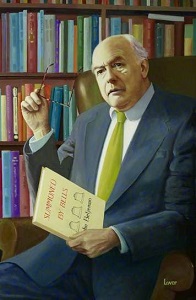
John Betjeman (28 augustus 1906 – 19 mei 1984)
Portret door Grahame Laver, 2003
De Duitse schrijver en vertaler Elmar Schenkel werd geboren in Hovestadt (Westfalen) op 28 augustus 1953. Zie ook alle tags voor Elmar Schenkel op dit blog.
Uit: Geisterzüge
„Auch die Gespenster sind nicht mehr das, was sie einmal waren oder vorgaben zu sein: neblige Gespinste, die aus der dunklen Nacht auftauchen oder ein kühler Hauch Jenseits in einer warmen Finsternis.
Die Ungeheuer, mögen sie auch dank special effects in den Kinos noch tier- oder menschenförmig weiterleben, haben längst ganz neue Gestalt angenommen: in technischen Großkatastrophen, im Börsenkrach oder als Terrorsysteme.
Die Gespenster (nicht die Mystik, wie Musil es sich wünschte) sind taghell geworden, je weiter die Technik voranschreitet und je mehr die analoge Welt von einer digitalen abgelöst wird. Das Flimmern, die unerklärliche Verdoppelung von Symbolen auf dem Bildschirm, der Computer, der sich nicht mehr ausschalten, das elektronische Wagenfenster, das sich nicht mehr per Hand öffnen lässt, sind nur die geringsten Beispiele einer Technik, die sich als eine Parallelwelt zu der unsrigen entwickelt hat und zu der wir nur mittels Helfer und Magier, die wir Spezialisten nennen, noch Zugang haben. Selbst Kfz-Mechaniker sind inzwischen auf sie angewiesen. Wenn Technik zurückschlägt, so nur auf eigenartig zufällige Weise, wie es einem Despoten entspricht.
Ernst Bloch hat einmal geschrieben, dass nicht die Aufklärung die Gespenster und den Aberglauben vertrieben habe, sondern schlicht und einfach das elektrische Licht: „Die Glühbirne im schattenarm gewordenen Zimmer hat die Anfechtungen des Nachtgrauens weit gründlicher geheilt als etwa Voltaire.“ Er hat recht, wenn er die alten Gespenster damit meint, jene lichtscheuen Gestalten aus den Dämmerungszonen der Welt und des Bewusstseins. Und doch hat Technik schon im Zeitalter der ersten industriellen Revolution es nicht vermocht, uns die Gespenster auszutreiben. Vielmehr haben diese es verstanden, sich in die neuesten Errungenschaften der Zeit einzunisten und sie sozusagen von innen her aufzulösen mit der Botschaft: ihr wisst nicht, wohin euch diese Maschinen tragen werden, keiner von euch weiß, in welche Richtung der Fortschritt geht. Auch Bloch gesteht schließlich ein, dass nach dem kostümierten Spuk der Vergangenheit uns noch weiterer und echter Spuk ins Haus steht in einer Welt, „deren Technik das Urböse geradezu ungeahnt elektrifiziert hat.“
Nirgendwo ist der Zweifel am Fortschritt sinnfälliger geworden als bei jener technischen Errungenschaft, die in ihren Auswirkungen noch am ehesten mit unserer digitalen Revolution vergleichbar ist.“
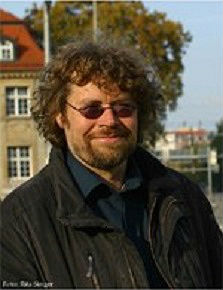
Elmar Schenkel (Hovestadt, 28 augustus 1953)
De Duitse dichter, schilder en revolutionair Harro Paul Harring werd geboren op 28 augustus 1798 op de Ibenshof in Wobbenbüll in Noord-Friesland. Zie ook alle tags voor Harro Harring op dit blog.
Der Bundestag
In Frankfurt, da sitzt der deutsche Bund
Und macht Verbote auf Verbote kund!
Das wird dem deutschen Bund recht schwer –
Denn er findet gar wenig zu verbieten mehr.
Drum stöbert er emsig in jedem Mist,
Wenn nur irgend was drin zu verbieten ist.
Und nächstens wird er mächtig schrei’n:
Es darf in den Straßen kein Pflaster sein!
Denn so lang’ das Volk auf’m Pflaster geht;
Eine Waff’ ihm noch zu Gebote steht.
Ein gefährlich’ Ding; – so’n Pflasterstein!
Drum muß das Pflaster verboten sein!
Der Bundestag fürchtet sich sehr vor’m Tod,
Drum arbeitet er – an dem Pflaster-Verbot.
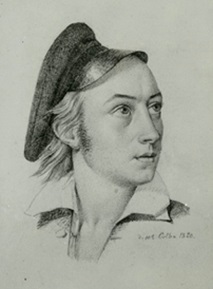
Harro Harring (28 augustus 1798 – 15 mei 1870)
Portret door Hermann Wilhelm Bissen, 1820
Zie voor nog meer schrijvers van de 28e augustus ook mijn blog van 28 augustus 2016 deel 2.

